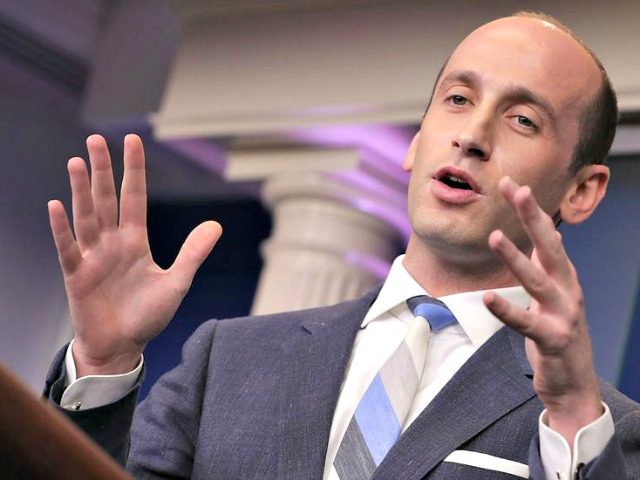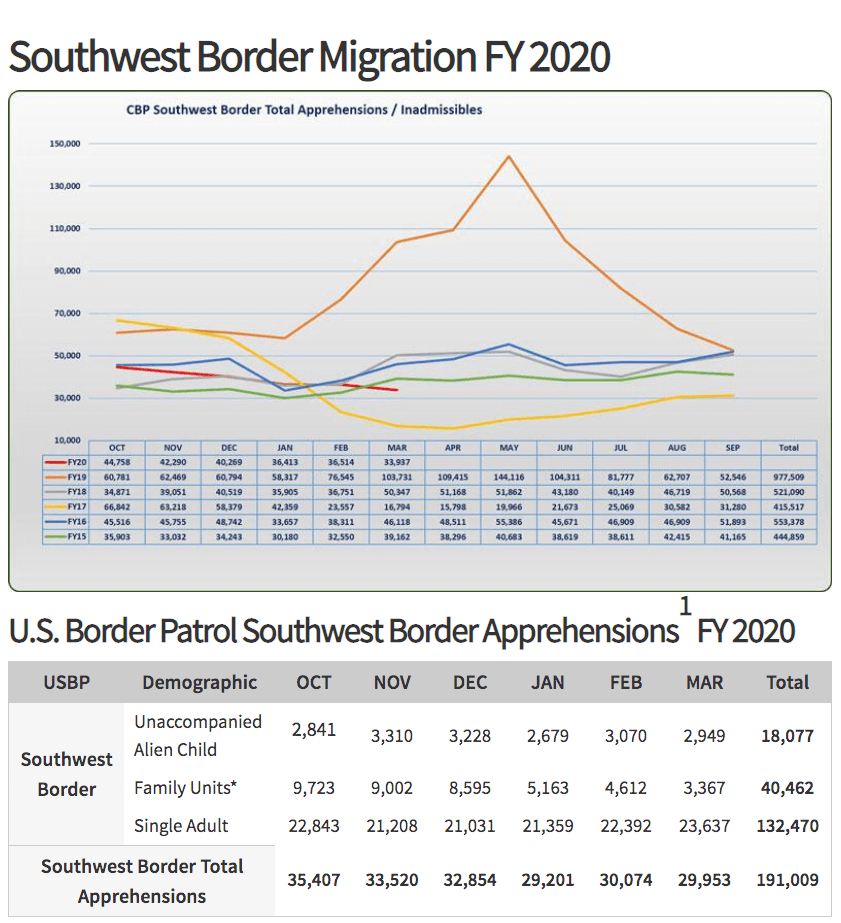President Donald Trump’s unprecedented April 22 shift of immigration policy to help Americans will also slow chain migration into the United States, according to a recording of a White House briefing that was leaked to the Washington Post.
The recording included comments from Trump’s close ally and aide, Steven Miller, said the Post:
Miller told the group that subsequent measures were under consideration that would restrict guest worker programs, but the “the most important thing is to turn off the faucet of new immigrant labor,” he said, according to a recording obtained by The Washington Post. Miller indicated that the strategy is part of a long-term vision and not seen only as a stopgap.
“As a numerical proposition, when you suspend the entry of a new immigrants from abroad, you’re also reducing immigration further because the chains of follow-on migration that are disrupted,” said Miller, one of the executive order’s main authors. “So the benefit to American workers compounds with time.”
The new policy is a huge shift from the establishment’s preference for a high-immigration, low-wage economic strategy. A new Rasmussen poll shows 2:1 support for Trump’s Americans-before-immigration policy.
The policy shift against chain migration and towards Americans has infuriated immigration lawyers and progressives. An article by immigration lawyer Doug Rand said:
Out of the 1.1 million green cards that the United States typically issues each year, some 358,000 would not be approved as long as this proclamation is in effect. For as long as this proclamation is in effect, the parents, siblings, and adult children of U.S. citizens, as well as spouses and young children of permanent residents, simply won’t be allowed to begin a new life together in the United States.
Any reduced flow of immigrants helps Americans and legal immigrants by pushing up salaries, reducing housing prices, and sidelining diversity disputes.
But Trump’s huge policy shift was also a disappointment for many of Trump’s supporters because it did not chop the painful wave of white-collar visa workers, such as the H-1B and L-1 workers.
Yet Trump’s proclamation announcing immigration policy also invited the public to protest and lobby Trump and his deputies for additional incremental changes during the next several weeks.
Those bad-cop protests and good-cop support will help Trump show his Fortune 500 donors whom he needs in the election that he really has no political choice but to incrementally reduce the use of visa workers, advocates tell Breitbart News. That would be a huge economic change because the visa programs are used to inflate the stock values of many Fortune 500 companies.
“We have 30 days to force President Trump to keep the promises he made four years ago, that’s 30 days to turn the tide of job displacement that started in the late 1990s,” said a statement from Kevin Lynn, founder of U.S. Tech Workers.
Lynn ironically quoted Bolshevik leader Vladimir Lenin to urge middle-class workers to step up their protests against businesses’ continued use of foreign workers during the coronavirus crash:
They say things are always darkest before the dawn. And things are looking pretty dark right now. Aside from issues unique to tech workers, millions and millions of Americans are hurting, and we have seen just a few of what will be many shoes to drop that will further imperil not only our jobs, but perhaps even food and housing security.
My DC voicemail box was filled this week with angry voices, the voices of people that are desperate yet eager to join in the fight. To quote Lenin, “There are decades where nothing happens; and there are weeks where decades happen!”
“I think it is great that [Trump] did it,” said Hilarie Gamm, the pseudonymous software professional who helped create the American Workers Coalition. Now, the new policy creates the opportunity for Trump to win more voters by showing he is implementing his popular 2016 promises, she said.
Trump’s deputies are already promising further shifts. Acting head of homeland security Chad Wolf told Fox News April 23:
This is a first step, as you indicated. I think you’ll see additional steps. And in that executive order that the president issued yesterday, it actually directs the Department of Homeland Security, as well as the Department of Labor to look at these non-immigrant, or temporary visa programs and come back to him with recommendations.
Trump’s promise to revisit the issue echoes the President’s incremental strategy that has stopped the huge wage of blue-collar illegal migrants at the southern border.
Trump’s first fix-everything efforts were entirely blocked by Republicans and Democrats in Congress. Those defeats forced him to gradually build a dense wall of regulations, diplomatic agreements, emergency declaration, judges, and steel that has effectively blocked the flood of migrants.
Trump pushed harder whenever he was temporarily blocked, and his incremental strategy has minimized blue-collar migration.
In May 1027, 140,000 migrants arrived in a month — and most were released into the U.S. to take apartments and jobs or K-12 desks.
In March, the arrivals were almost 30,000, and only a few migrants were allowed into the country.
Lynn and other advocates are now using Trump’s immigration shift as a foundation to argue that the Americans-first immigration curbs should logically be extended to the 1.5 million college graduate visa workers.
Those workers include roughly 900,000 workers in the H-1B and H4EAD programs, 300,000 in the OPT and CPT programs, plus many more in the L-1, J-1, TN, and B-1 programs. The visa worker programs also keep roughly 80,000 H-2B laborers and the 250,000 H-2A agriculture workers in Americnas’ jobs.
The white-collar migrants are especially controversial because they have been used by Fortune 500 companies to push many American graduates out of jobs, wages, careers, and the middle class. For example,Dan Stein, president of the Federation for American Immigration Reform, blasted the White House on April 23 for not including the visa workers:
Under what craven notion of American equity would the United States continue a subordinated labor importation program at a time when American workers are in such distress? The optics are devastating — we are becoming a two-class society, with a servant caste relegated to guestworker status continuing apace while Americans search desperately for employment.
Stein’s statement was subtitled “30 Days to Make Things Right.”
Most journalists in the establishment media have been unable to follow the money during the debate.
For example, the Washington Post is owned by Jeff Bezos, who also owns Amazon, which hires many visa workers. Bezos’s reporters have almost entirely avoided the economic damage being done to their college graduate peers, and the article about Miller’s statement made a brief reference to the economic winners from migration:
Miller has been the leading proponent of the argument that immigrants compete for jobs with U.S. workers and depress their wages. The argument is anathema to many economists and pro-business Republicans who argue that immigration fuels long-term U.S. growth and keeps U.S. industries competitive.
The debate remains a significant fault line in the Republican Party, with many GOP members unwilling to support the more hard-line positions Miller backs.
But the reporters did shrug off progressive claims that the migration shift is driven by racism, and they repeatedly highlighted Miller’s economic case for the policy shift:
“All around the country, Americans of every political stripe will rally behind an initiative to make sure that they, their children, their parents, their husbands, wives, sons, uncles, nephews, cousins can be the first to get a job when it opens up, to get her old job back when they rehire or to keep their job if they already have one,” he said.
Many polls show American voters like — and want to like — immigrants. But the polls also show that Americans strongly object to companies hiring foreign workers before American employees. For example, an August 2017 poll reported that 68 percent of Americans oppose companies’ use of H-1Bs to outsource U.S.-based jobs that could be held by Americans.


COMMENTS
Please let us know if you're having issues with commenting.